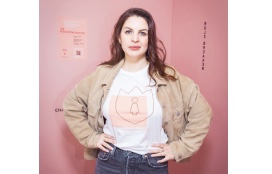Activist, lawyer and Forbes 30 Under 30 star Anna Rivina reflects on women’s rights and her fight to get back home
When Russia invaded Ukraine on 24 February of last year, Russian human rights lawyer Anna Rivina anticipated the worst for Ukrainian women.
She quickly left Moscow for the Georgian capital Tbilisi to set up an international project aiming to tackle gender-based violence in war.
Rivina, best known as the founder of Russia’s most prominent domestic violence organisation, nasiliu.net (No to Violence), launched her new programme, Labrint, (‘maze’ in Russian) in July under the auspices of her existing eponymous Rivina Foundation, also based in Georgia.
“I have my expertise in gender-based violence and I understood that because of the [Russian invasion of Ukraine], there would be an increase in gender-based violence,” she told openDemocracy.
But her work has attracted Russia’s attention. On 10 February this year, the country’s Ministry of Justice added Rivina to the ‘foreign agent’ list, which has primarily targeted free expression and civic activism in Russia.
According to Russian law, a foreign agent is a person, entity, or media outlet receiving support from foreign states, or engaging in political activities in Russia while “under foreign influence”.
Four days later, without explanation, she was refused entry back into Georgia, where she had been living for nearly a year, after a visit to Armenia. Rivina said she had tried to enter Georgia as an Israeli citizen (she has dual citizenship). Both Russians and Israelis have the right to enter Georgia visa-free for 360 days.
“In Russia, a lot of people try to make me feel ashamed because of my foreign agent status,” said Rivina. No to Violence had already been named a ‘foreign agent’ in 2020. “In Georgia, I have the same challenge. But I didn’t do anything wrong.”
Indeed, the need for Rivina’s work is clear. In June 2022, the month before Labrint was set up, the United Nations said it had received 124 reports of conflict-related sexual violence in Ukraine, though the real number of cases is likely to be far higher.
Georgia denies entry to Kremlin critics
Georgia has denied entry to several other Kremlin critics, Russian human rights defenders and journalists over the last year without explanation. Rivina wants to “fix this” by filing a complaint through her lawyers to the Georgian Ministry of Interior Affairs. She plans to take her case to a local court – and, if necessary, the European Court of Human Rights.
As a lawyer, Rivina does what she knows best: fighting for human rights. She recognises and uses the privilege that dual citizenship, and money to buy a plane ticket, give her over other Russian human rights defenders labelled ‘foreign agents’ and under threat of deportation from Georgia.
Without Schengen visas to the European Union, tens of thousands of Russians moved to Georgia and Armenia, both former Soviet countries, since the Russian invasion of Ukraine last year.
Rivina believes that taking legal action will help highlight the situation for others refused entry to Georgia. “I have some influence. People know me and there’s media coverage because of my situation,” she explained.
Rivina, now 32, was included in the Forbes ‘30 Under 30’ list in 2020. She was also featured on the cover of Time magazine in 2021, where she spoke about the increase in domestic violence cases in Russia under Covid-19 restrictions.
Expansion of ‘foreign agents’ laws
Since 2012, when the first ‘foreign agents’ law was adopted in Russia, a total of 65 human rights non-profits (both foreign and local) and 276 people have been added to various ‘foreign agents’ registers. Russian authorities have used the law as a legal pretext to close down human rights groups such as Memorial International, recipient of the Nobel Peace Prize in 2022.




